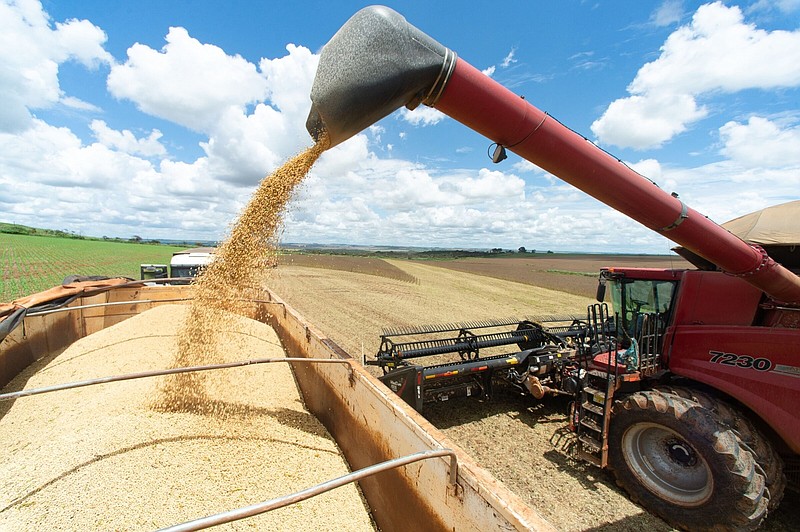Agricultural powerhouse Brazil is harvesting one bumper crop after another. Yet, growers are going bankrupt at an alarming rate, dealing a blow to investors in the fast-growing $7 billion market for agribusiness funding.
Tumbling corn and soybean prices are sparking defaults, undermining returns for so-called Fiagros, the Brazilian investment funds backed by agricultural receivables such as interest, dividends and land-lease payments. Funds including Galapagos Recebiveis do Agronegocio and SFI Investimentos do Agronegocio have plunged below the value of their underlying assets after farmers skipped payments on some credit facilities.
It's a surprising turn of events for a country that's seen its agribusiness expand fast over the past decade -- Brazil first overtook the United States as the world's largest soybean shipper in 2013 and climbed to the top spot for corn just last year. The number of growers filing for bankruptcy protection surged sixfold in 2023, according to credit data provider Serasa Experian.
"There's a wave of bankruptcies in the Brazilian agriculture sector, and that's very worrying," said Paulo Sousa, who heads the Brazilian operations of Cargill Inc., the world's largest crop trader. "That brings uncertainty for financiers. A lot of new money has entered the sector in recent years, and that's a risk."
Fiagros were first introduced in 2021 and gained popularity with retail investors seeking high returns and exposure to the fastest-growing sector in Latin's America's biggest economy. These investment funds had more than $7 billion under management in January, up 43% from a year earlier, according to capital markets association Anbima.
Brazil's agriculture boom was in part funded by these new instruments. Prior to Fiagros, the sector had been largely shut out of capital markets, relying on funding from banks and trading firms. Fresh cash helped growers expand soybean plantings at a record pace -- exactly 4.6 million additional acres a year on average since 2019, according to Brazil's national supply company, or Conab.
Now a rash of defaults is fueling concern about the health of those funds and jeopardizing a push to broaden access to capital through debt securitization. If more and more farmers file for bankruptcy, it could also pose a risk for the Brazilian economy, which has grown increasingly dependent on agriculture.
Big banks including Itau BBA SA are tracking clients with debt coming due in the short term to renegotiate maturities and avoid defaults.
"2024 will be a more challenging year," Pedro Fernandes, director of agribusiness at Itau, said in an interview. "Some farmers will have to put off debt payments."
Crop prices have been in decline since mid-2022 as bumper global supplies offset trade disruptions caused by Russia's invasion of Ukraine. A Bloomberg gauge of key agricultural commodities tumbled almost 16% last year, the biggest drop in a decade. In Brazil, prices fell even further, with corn and soybeans trading at large discounts to futures in Chicago.
Farming companies filing for bankruptcy protection have included Elisa Agro Sustentavel Ltda., a soybean and corn producer in the state of Goias. The company is part of a group that sold $59 million in local bonds known as CRAs to investors including Galapagos. Grupo Castilhos, which grows crops on roughly 222,000 acres in Bahia and Parana states, has also skipped payments on CRAs.
Elisa Agro said it's working with creditors and advisers to find a "feasible" restructuring plan. Grupo Castilhos didn't reply to a request for comment.
The number of growers going bust -- 127 last year -- is relatively small, but the pace at which Chapter 11 filings is accelerating is "concerning," said Marcelo Pimenta, head of agribusiness at Serasa Experian. The figures is also just the tip of the iceberg, as farmers usually delay payments, renegotiate debts and default before seeking bankruptcy protection.
The profitability squeeze has also hurt other sectors: sales of tractors and other farming machinery plunged 20% last year, the biggest drop in nearly a decade, and a blow for the likes of Deere & Co. and CNH Industrial NV. Pesticide maker FMC Corp. and seed producer Corteva Inc. were also hard hit.
AgroGalaxy Participacoes SA, a crop-input distributor, lost almost 80% of its value over the past year following a decline in sales and higher delinquency rates. The Aqua Capital-backed company said in February it was seeking a covenant waiver after its leverage rose above the level agreed with debt holders.
The Fiagro industry "grew too quickly and there has been a governance issue with excessive exposure to rural producers," said Leandro Albuquerque, an analyst at S&P Global Ratings. Most issuers of receivables backing those investments have no rating and don't provide any public information to investors.
Galapagos, whose Fiagro is already contending with bankruptcy filings and defaults, said lenders are becoming more cautious.
"It's highly likely that lending will become constrained, maturities will be shorter and capital will be more expensive," said Carlos Fonseca, a partner at the Sao Paulo-based fund. "But the agriculture industry is solid. We have a lot of great producers and entrepreneurs. I believe this issue will be solved soon."
For Cargill's Sousa, the risk is that much needed credit will disappear.
"Capital is skittish, and any threat could lead it to seek calmer waters," he said. "Working capital in agribusiness is like oxygen."
Information for this article was contributed by Gerson Freitas Jr. of Bloomberg News.
